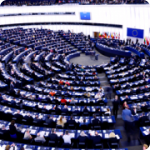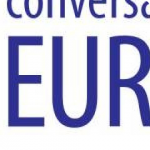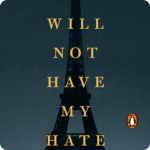Past Events

Join the European Studies Center at Pitt for a Virtual Book Club to explore recent works by European authors. Our first book is Go, Went, Gone by Jenny Erpenbeck. Discussion dates are December 6 and December 10. Those who RSVP by 10/22 can receive a FREE book and the event is open to ALL. RSVP at https://forms.gle/EqVJieX1XgVvWd1i7

Join the European Studies Center at Pitt for a Virtual Book Club to explore recent works by European authors. Our first book is Go, Went, Gone by Jenny Erpenbeck. Discussion dates are December 6 and December 10. Those who RSVP by 10/22 can receive a FREE book and the event is open to ALL. RSVP at https://forms.gle/EqVJieX1XgVvWd1i7

The High School Model European Union is an annual event for high school students, with this year's simulation taking place virtually via Microsoft Teams. The goal of the Model EU is to give high school students the opportunity to learn about the workings of the European Union through a hands-on simulation of a meeting of the European Council. Playing the role of presidents and prime ministers, students spend a day engaged in intense negotiations over current issues impacting the EU. Registration Deadline: Wednesday, October 28, 2020 Cost: $10/student More information and Registration: https://www.ucis.pitt.edu/esc/outreach/students/model-eu

- Dr. William Scott, Associate Professor in the Department of English Literature.
- Virtual, see website to join!
https://docs.google.com/forms/d/1WJqjaw22TlwmRpqA62bleCd3o0-bda84vGt_v7c... The conversation will be led by Dr. William Scott, Associate Professor in the Department of English Literature.

- Zoom
As part of the Year of Creating Europe, previous sessions have focused on different attempts to create unity through diversity across Europe. In this session, the focus is on Scandinavia. Our panel of experts discuss how this region created social cohesion and costs and benefits that come with it. In its efforts to make a nation that is diverse but coalesces, how has Scandinavia been able to create trust in it's institutions? Register Here: https://pitt.zoom.us/webinar/register/WN_XYToCOtmTFS77ljMKleb7Q

- Zoom
Speak with a student ambassador from the European Studies Center to learn about their four certificate offerings, events, scholarships, symposia and more. Zoom Link: https://us02web.zoom.us/j/86171673232?pwd=aThWaHhxeDFsTEdPeGZsdzZaS01EQT09 Password: 4Lkh8d

France is often portrayed as a case of color-blind civic ‘assimilation’ despite a shift to ‘integration’ since the 1980s. However, the creation of institutions such as the High Council for Integration (1989-2013) and the first ever census-based survey on the assimilation of immigrants and their France-born children (Mobilité géographique et insertion sociale, Tribalat 1993) signaled starting from the 1990s the foregrounding of cultural differentiation in public life and the promotion of ethnic origin as a framework and primary principle of classification (Bertaux 2016:1496). In this process, integration came to be perceived as a one-way ticket for ‘ethnic Others of foreign descent’ to embrace the cultural values and institutions of a purportedly homogeneous ‘non-ethnic’ core of Français de souche (‘French of French stock’). Papers in this panel argue that race/ethnic relations in France today have inherited this ideology. They show that audible characteristics of local French, a shared linguistic heritage in Marseilles, are dismissed in the speech of working-class youth (Evers), historically attested pronunciation features are recast as multiethnic innovations in working-class Parisian French (Fagyal), years of ‘banlieue literature’ addressing the themes of race and citizenship have suffered from distorted representations in the media (Horvath), and entire segments of the French population now consider themselves Citizen Outsiders for whom the cultural characteristics of the ‘uniform whiteness’ of the Français de souche remain largely alien (Beaman). The panel casts light on the utopia of a color-blind French Republic that, in its efforts at treating citizens equally before the law, makes it impossible for them to belong. Panelists: Jean Beaman, University of California Santa-Barbara Cécile Evers Cecile, Pomona College Zsuzsanna Fagyal , University of Illinois at Urbana-Champaign Christina Horvath, University of Bath Register Here: https://pitt.zoom.us/webinar/register/WN_XG-B5qdrTrWrrIS09NaG2A
- Zoom
Around the world, countries are undertaking fiscal stimulus responses in order to accelerate their recovery from COVID-19. On 21 July 2020, EU leaders agreed to a €1,824.3 trillion (ca $2 trillion) package which includes a €1,074.3 billion budget for the next seven years and a major stimulus package of €750 billion. The Next Generation EU (NGEU) stimulus package will help to rebuild and to support investment in green and digital transitions. Climate action is at the forefront of this historic agreement with a target of 30% of total expenditures going towards efforts to reach EU climate neutrality by 2050. A part of the package/agreement is the €150 billion Just Transition Mechanism (JTM). By targeting support to the most affected regions, the JTM program aims to guarantee that the EU’s “climate-neutral economy happens in a fair way, leaving no one behind.” The EU also seeks to provide worldwide impact by serving as a global leader on reaching science-based targets of the Paris Agreement and by promoting implementation of ambitious environmental, energy, and climate policies with partner countries. Last year the EU announced the European Green Deal - Europe's new growth strategy for achieving climate neutrality by mid-century. Most recently the European Commission proposed to increase the 2030 target to reduce EU greenhouse gas emissions by at least 55% in the next decade, compared to 1990 levels. As a part of the EU's climate neutrality agenda, innovative actions were proposed on clean hydrogen economy, methane emissions reduction, energy efficiency in the building sector, and offshore wind deployment. What does Europe's drive for climate neutrality mean for the transatlantic cooperation? How can the EU and the next U.S. Administration work together towards a shared transatlantic agenda? Event Registration:https://www.cvent.com/d/b7qrr4 #JMintheUS

- Dr. June Park, Dr. Dev Lewis, Jared Kohler
- via Zoom online
Internationalize your career-focused courses with the BETH (Business, Energy, Technology, and Health) series. For year 3 of our faculty development workshops for community colleges and minority-serving institutions, the University Center for International Studies at the University of Pittsburgh is offering a series of monthly webinars focused on technology. Our second webinar will examine Technology in the Time of COVID, specifically addressing international responses to the pandemic regarding efforts to mitigate community spread through contact-tracing. Presenters are: Dr. June Park, 2020-2021 East Asia Voices Initiative Fellow, East Asia National Resource Center, Elliot School of International Affairs, The George Washington University. Dr. Dev Lewis, Fellow and Program Lead at Digital Asia Hub Jared Kohler, Systems Engineer, Carnegie Mellon University CREATE Lab Register here

- Shireen Hunter, Eldar Mamedov, Mohammad Homayounvash, Eric Lob
- Zoom
The EU's relations with Iran have strengthened since the signing of the Joint Comprehensive Plan of Action in 2015. These relations have become more important now, as the current US administration is determined to further undermine the agreement by pressing the UN to restore economic sanctions and extend the arms embargo against Iran. The EU’s disagreement with the US position has brought the nuclear non-proliferation regime, the maintenance of international agreements, and the future of European relations with the US and Iran at a crossroads. This panel will explore these topics and provide an update on the current state of EU-Iran relations after the US elections. Panelists Shireen Hunter, Ph.D., Honorary Fellow, Prince Alwaleed Bin Talal Center for Muslim-Christian Understanding (ACMCU), Georgetown University Eldar Mamedov, Political Advisor European Parliament Mohammad Homayounvash, Ph.D., Director, Institute for Interfaith Dialogue and Education at Miami-Dade College; Lecturer, Steven J. Green School of International & Public Affairs at FIU, and Religious Studies Department at the University of Miami Eric Lob, Ph.D., Associate Professor, Dept. of Politics & International Relations, Steven J. Green School of International & Public Affairs, FIU Moderator: Markus Thiel, Ph.D., Associate Professor, Dept. of Politics & International Relations, Steven J. Green School of International & Public Affairs; Director, Miami-Florida Jean Monnet Center of Excellence, FIU Event Registration: https://www.eventbrite.com/e/webinar-an-update-on-eu-iran-relations-tick...

- Online via Zoom
Throughout our history, art and artists have resisted oppression, violence, injustice, and inequality. Some of the world’s most interesting art is on the streets and easily accessible to all. In this workshop we will discuss how protest art uses public space to engage in dialogue between the artist and the public. At an unprecedented moment in geopolitics, the work of public artists amplifies activism, resistance, and solidarity. Artists give context and vision to broad social movements, supporting those who have been marginalized and who need justice. Artists around the world question what is and why that transcends national boundaries and politics . We will examine works of Ai Wei Wei, Keith Herring, murals from Northern Ireland, to the Black Lives movement. Friday, November 13 6:00 - 8:30 pm (Eastern Time) Jerome 'Chu' Charles: "Waking Up With 'Chu' - My Road to the Black Lives Matter Movement" Michael-Ann Cerniglia: "Teacher led session: Creative Resistance Case Studies for the K-12 Classroom" To learn more, please visit our website: https://www.ucis.pitt.edu/ncta/ Register here!

- Sam Taylor
Sam Taylor is a British novelist and literary translator who now lives in the United States. He has translated novels by Maylis de Kerangal, Leïla Slimani and Clémentine Beauvais (among others), as well as Riad Sattouf’s graphic novel The Arab of the Future. On 13 November 2020, Sam Taylor will talk about his translation of Antoine Leiris’ You Will Not Have My Hate (2016) and the upcoming translation of Leiris’ La vie, après. He will describe the links between translation and literary creation, and talk about career possibilities in translation and publishing. Contact Pr. Kaliane Ung (khu3@pitt.edu) for the Zoom link.

- Zoom
Join us for a roundtable discussion of the state of the transatlantic relationship in the wake of the U.S. Presidential Elections. Featuring: Dr. James Goldgeier, American University (NATO and security), Mr. Ignacio Garcia-Bercero, DG Trade (former TTIP chief negotiator), Dr. Mai’a Cross, Northeastern University (Europe and the Politics of Crisis). Moderated by Steven Sokol (American Council on Germany). Hosted by the European Studies Center at the University of Pittsburgh, the Center for Transatlantic Studies at the Georgia Institute of Technology, and the Transatlantic Policy Center at American University. This event is part of the #JMintheUS event series, an initiative of Jean Monnet Centers in the U.S. https://pitt.zoom.us/webinar/register/WN_LvStS_L3RTWaAYZwgEdx3w

- Online via Zoom
Throughout our history, art and artists have resisted oppression, violence, injustice, and inequality. Some of the world’s most interesting art is on the streets and easily accessible to all. In this workshop we will discuss how protest art uses public space to engage in dialogue between the artist and the public. At an unprecedented moment in geopolitics, the work of public artists amplifies activism, resistance, and solidarity. Artists give context and vision to broad social movements, supporting those who have been marginalized and who need justice. Artists around the world question what is and why that transcends national boundaries and politics . We will examine works of Ai Wei Wei, Keith Herring, murals from Northern Ireland, to the Black Lives movement. Wednesday, November 11 6:00 - 8:300 pm (Eastern Time) Eric Shiner: "Kusama Yayoi, Radical Performance as a Means of Self-Preservation and Social Critique" Erin Hinson: "Loyalty in Dissent: Loyalist Public Murals in Pre- and Post-Ceasefire Northern Ireland" To learn more, please visit our website: https://www.ucis.pitt.edu/ncta/ Register here!
- Dora Vargha (Exeter University)
- Zoom
In the past year more people have become familiar with the graph of the epidemic curve than ever before. Beginnings, peaks and endings of COVID-19 occupy everyday discussions, inform policies, shape social interactions and provide bases for criticism and political action. What constitutes an ending, when that endpoint is and what might bring it about is more and more unclear, however. Through historical case studies, this talk explores some of the stakes in how we think about the temporalities of epidemics, and how their historical framing may impact on public health responses. Event Registration:https://ufl.zoom.us/webinar/register/WN_d5MQzqD6SfOBZvETP9wd4A #JMintheUS
- ‹ previous
- 42 of 51
- next ›
